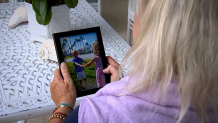It was a picture-perfect holiday vacation for the Debbs family, full of fun activities for the children and plenty of family time. The South Florida family, which was vacationing in the Northeast at the time, even got to enjoy a white Thanksgiving.
“Yes, he got to have snow,” Merrill said of her 11-year-old twin son, Oakley.
But that all changed when on that Wednesday night in 2016, Oakley ate a bite of pound cake that had been sliced and left on the kitchen counter.
“Hand bite,” she said. “No slice, no knife, no fork. Nothing significant.”
The cake had walnuts and Merrill remembers how Oakley immediately became worried.
“He says, ‘Mommy, I think I just ate a nut,” she said Oakley told her. “I was like, what? He’s like, ‘I think I just ate a nut.’”

At first, Oakley seemed fine.
“He doesn’t have a hive, he doesn’t have a blister,” Merrill said. “Doesn’t feel anything at all.”
Merrill gave Oakley over-the-counter allergy medication, as a precaution. Oakley took a shower and got ready for bed. But over an hour and a half after eating the pound cake, Merrill said he started complaining about stomach pain.
“I’m rubbing his back and he’s just lying there,” she said. “He’s not saying anything and I think, ‘well maybe he’s starting to fall asleep.’”
But he soon worsened and started vomiting, she said.
“He sits up, straight up,” she said. “Eyes are big. Runs to the toilet and vomits gain. But this time the difference is his eyes start to swell up and he says, ‘my throat, my throat, my throat.’ His throat starts to close up. He tells me to call 911. That’s the last thing he said to me.”
Merrill did not have epinephrine – the treatment of choice during a life-threatening reaction. By the time paramedics arrived and gave Oakley a shot of epinephrine, Merrill said it was too late.
“The epinephrine stopped the reaction inside his body but at this point, the heart had stopped too long and there wasn’t enough oxygen going to his brain,” she said. “He was basically brain dead.”

A few days later, the Debbs family made the difficult decision to say goodbye to Oakley.
“It’s a tough story,” she says, wiping tears from her face.
But it is a story Merrill wants others to hear.
“Hopefully somebody else hears me, hears this story and decides to put together an emergency plan for their child,” she said.
That is something Merrill believes could have helped save Oakley’s life. He had a history of asthma and had been diagnosed with a nut allergy, which is why she said they avoided nut products.
Turning Pain into Action
Nearly seven years after losing Oakley, the pain is still raw and the grief never ends.
But over the years, Merrill has turned that pain into action. She started Red Sneakers for Oakley, shortly after his death, to raise awareness about food allergies and honor her son’s life. The organization is named for his love for red sneakers.
She thinks about her son every day.
“He was a great kid,” she said. “There’s so many things that remind me of him."
When you ask me to tell you the story, and let me tell you about my son, my son only lived to be 11. So I have those 11 years to tell you about.
Merrill Debbs
Merrill would like to see additional funding for food allergy research.
She said they are also pushing for an online resource guide and more uniform school policies and training requirements related to food allergies statewide.
You can read more about Oakley and learn about Red Sneakers’ mission by clicking here: https://www.redsneakers.org/

Additional Resources
If you or a family member has been diagnosed with a food allergy, learning as much as you can about the allergy and advocating for yourself or your family is the best thing you can do to stay safe.
Take the time to understand your allergy and how to manage it. Write down any questions you may have before your doctor’s appointment: What is epinephrine? What options do you have to administer it? When should you use it? What are the signs of anaphylaxis?
FARE has a long list of resources that may help you navigate a food allergy diagnosis. Click here to learn more: https://www.foodallergy.org/
FARE also has a sample emergency care plan you can review with your doctor, detailing the signs of a severe allergic reaction and the steps that should be taken in the event of a reaction or exposure to a known allergen: https://www.foodallergy.org/living-food-allergies/food-allergy-essentials/food-allergy-anaphylaxis-emergency-care-plan
You can learn more about food allergies from the Food and Drug Administration by clicking here: https://www.fda.gov/food/food-labeling-nutrition/food-allergies

